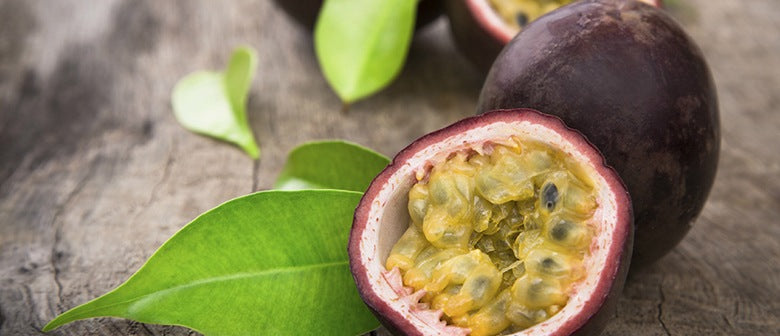FAQs Passionfruit
Passionfruit are such a treat to eat, and are a great addition to the garden with their fragrant flowers and glossy leaves. Passionfruit will grow happily on a fence or trellis that has full sun and will bear fruit in a relatively short time (8-9 months).
However, as with all plants, passionfruit can get diseases or struggle to grow if not in the right situation and location. If you’re thinking of growing passionfruit, or you have a vine already, check out our most frequently asked questions, and the answers, below.
How long do passionfruit vines last?
Janene asked: How long do passionfruit vines normally last? Ours is starting to look rather decrepit after several years of heavy fruiting. Last year it was infested with passion vine hoppers and it did not produce much fruit.
Answer: We would recommend planting new passionfruit vines every 4-5 years (keep in mind it does take a year for a new plant to give you fruit) to get the best out of your vine. Passion vine hoppers can be controlled with Diamataceous Earth, although if a plant is already under stress it will be more susceptible to insect infestations and disease. To reduce the stress on the passionfruit vine, ensure it gets plenty of liquid fertiliser and plenty of water in the summer months.
Passionfruit dying?
Shona asked: My passionfruit is suddenly shriveling up and dying. I don’t know the cause, but I do notice that if looks as if something has been stripping the bark near the base. Do you think this could be the cause? What would do this? Is it OK to plant a new passionfruit in the same place?
Answer: This sounds like root rot or collar rot, which can happen early in the season when the soil is still too wet and cold. Try planting a little higher as to provide better drainage and as a consequence a warmer soil. You will still need to provide a good mulch to sustain good moisture content for the summer months.
Curling leaves
Jeff asked: My passionfruit vine has some curling leaves. What should I do?
Answer: Your passionfruit vine may be infested with aphids. These sucking insects commonly cause passionfruit leaf curl. Treat the plant by spraying with Kiwicare Organic Insect control available at your local Palmers if you find this to be the case. If no Aphids then you may have the fungal disease leaf curl which does affect passion fruit vines. Check for fungal spores in the curled leaves and at the joins of the leaves to the vine and treat with the Kiwicare product Organic Copper Oxy.
Time to plant
Roy & Karen asked: Can you please tell us if it is too late to be planting passion fruit plants in early January?
Answer: January is actually quite a good time to plant passionfruit as the soil is nice and warm which will help get the plant established. They won’t fruit until next year even if you planted them before Christmas.
Plant unwell
Ron asked: I had a very healthy passionfruit plant growing in a large container on my deck as we get heavy frosts. It is 1st year and in the last week the leaves are nice and green but they have gone all wrinkly and are not developing correctly…. It is in a very large container and has been well watered and fertilised I have checked to see if there are any uninvited little visitors on it and can’t see any.
Answer: Spray it with Derris Dust just to make sure there are no bugs, keep it well watered and mulched too. They are also very heavy feeders so consider whether it may be needing fertilising. Use of citrus fertiliser is probably best, but be mindful of the fact that its in a container, so don’t overdo the dosage. However, because its in a container, it may well need feeding more often. When winter comes, you may like to consider putting some frost cloth over it as well.
Moths on my passionfruit
Andrew asked: I have a passionfruit plant that is growing over the fence between our house and my neighbours. When I walk down the fence line, hundreds of small browny coloured moth type insects fly everywhere. What are these insects, and how do I stop them from sitting all over my passionfruit?
Answer: These are passionvine hoppers. We recommend spraying with Mavrik – which is also a bee friendly product. Alternatively, you can use Nature’s Way Pyrethrum, a natural insecticide derived from the flowers of a chrysanthemum species.
A disease?
Asked by Debbie: We have a grafted passionfruit which took off when we first planted it, but now it has like a dieback on stems that seem to go white and then the passionfruit die and the stems die, what is this and what can we treat it with. Parts of the vine are growing really well but we are worried that the whole thing might die.
Answer: Sounds like it is most likely dieback which can happen at times with passionfruit. Be careful not to give the plant too much water and cut out any dieback (cutting into the healthy part of the stem). You should then notice an improvement.
Mould and fungi on vine
Kate asked: My passionfruit vine has developed a mouldy/fungi disease, the leaves are dying and dropping. The vine has plenty of fruit. What is the best spray to use?
Answer: There is a range of fungicides available at your local Palmers store – but we’d suggest that copper oxychloride would be best. However, if you take in a couple of leaves with you into the store, they will be able to identify the disease and provide you with more information. Also, have a look at the Palmers How To Guide on Growing Passionfruit here.
Attracting bees
Lorraine asked: I have got passionfruit vines and was wondering if catmint and lavender would attract the bees as they are needed to pollinate the passionfruit. Could you suggest anything else that I could grow now that would attract the bees and grows fast?
Answer: Well done for bringing in the bees! Plants that bees love are lavender and borage (either white or blue) and also zinnias. These are favourites – especially borage!
Try these delicious passionfruit recipes!















